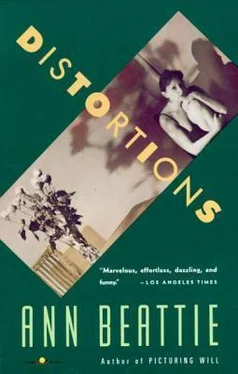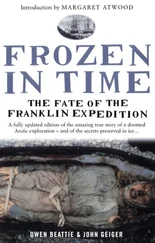Ann Beattie - Distortions
Здесь есть возможность читать онлайн «Ann Beattie - Distortions» весь текст электронной книги совершенно бесплатно (целиком полную версию без сокращений). В некоторых случаях можно слушать аудио, скачать через торрент в формате fb2 и присутствует краткое содержание. Год выпуска: 1991, Издательство: Vintage, Жанр: Современная проза, на английском языке. Описание произведения, (предисловие) а так же отзывы посетителей доступны на портале библиотеки ЛибКат.
- Название:Distortions
- Автор:
- Издательство:Vintage
- Жанр:
- Год:1991
- ISBN:нет данных
- Рейтинг книги:5 / 5. Голосов: 1
-
Избранное:Добавить в избранное
- Отзывы:
-
Ваша оценка:
- 100
- 1
- 2
- 3
- 4
- 5
Distortions: краткое содержание, описание и аннотация
Предлагаем к чтению аннотацию, описание, краткое содержание или предисловие (зависит от того, что написал сам автор книги «Distortions»). Если вы не нашли необходимую информацию о книге — напишите в комментариях, мы постараемся отыскать её.
Distortions — читать онлайн бесплатно полную книгу (весь текст) целиком
Ниже представлен текст книги, разбитый по страницам. Система сохранения места последней прочитанной страницы, позволяет с удобством читать онлайн бесплатно книгу «Distortions», без необходимости каждый раз заново искать на чём Вы остановились. Поставьте закладку, и сможете в любой момент перейти на страницу, на которой закончили чтение.
Интервал:
Закладка:
“I wouldn’t leave it.”
“You’re just a kid. You get dragged all over,” her father said. “Did you ever think you’d be here today?”
“It’s strange,” Alice said.
“It was a good idea,” Sam said. “I’m always right.”
“You’re not always right,” the little girl said.
“When have I ever been wrong?”
“You tell stories,” she said.
“Your uncle is imaginative ,” Sam corrected.
“Tell me another one,” she said to him.
“I can’t think of one right now.”
“Tell the one about the snakes’ shoes.”
“Your uncle was kidding about the snakes, you know,” Alice said.
“I know,” she said. Then she said to Sam, “Are you going to tell another one?”
“I’m not telling stories to people who don’t believe them,” Sam said.
“Come on,” she said.
Sam looked at her. She had bony knees, and her hair was brownish-blond. It didn’t lighten in the sunshine like her mother’s. She was not going to be as pretty as her mother. He rested his hand on the top of her head.
The clouds were rolling quickly across the sky, and when they moved a certain way it was possible for them to see the moon, full and faint in the sky. The crows were still in the treetops. A fish jumped near the rock, and someone said, “Look,” and everyone did — late, but in time to see the circles widening where it had landed.
“What did you marry Hans for?” Richard asked.
“I don’t know why I married either of you,” Alice said.
“Where did you tell him you were going while he was away?” Richard asked.
“To see my sister.”
“How is your sister?” he asked.
She laughed. “Fine, I guess.”
“What’s funny?” Richard asked.
“Our conversation,” she said.
Sam was helping his niece off the rock. “We’ll take a walk,” he said to her. “I have a long story for you, but it will bore the rest of them.”
The little girl’s knees stuck out. Sam felt sorry for her. He lifted her on his shoulders and cupped his hands over her knees so he wouldn’t have to look at them.
“What’s the story?” she said.
“One time,” Sam said, “I wrote a book about your mother.”
“What was it about?” the little girl asked.
“It was about a little girl who met all sorts of interesting animals — a rabbit who kept showing her his pocket watch, who was very upset because he was late—”
“I know that book,” she said. “You didn’t write that.”
“I did write it. But at the time I was very shy, and I didn’t want to admit that I’d written it, so I signed another name to it.”
“You’re not shy,” the little girl said.
Sam continued walking, ducking whenever a branch hung low.
“Do you think there are more snakes?” she asked.
“If there are, they’re harmless. They won’t hurt you.”
“Do they ever hide in trees?”
“No snakes are going to get you,” Sam said. “Where was I?”
“You were talking about Alice in Wonderland .”
“Don’t you think I did a good job with that book?” Sam asked.
“You’re silly,” she said.
It was evening — cool enough for them to wish they had more than two towels to wrap around themselves. The little girl was sitting between her father’s legs. A minute before, he had said that she was cold and they should go, but she said that she wasn’t and even managed to stop shivering. Alice’s son was asleep, squinting. Small black insects clustered on the water in front of the rock. It was their last night there.
“Where will we go?” Richard said.
“How about a seafood restaurant? The motel owner said he could get a babysitter.”
Richard shook his head.
“No?” Alice said, disappointed.
“Yes, that would be fine,” Richard said. “I was thinking more existentially.”
“What does that mean?” the little girl asked.
“It’s a word your father made up,” Sam said.
“Don’t tease her,” Alice said.
“I wish I could look through that man’s glasses again,” the little girl said.
“Here,” Sam said, making two circles with the thumb and first finger of each hand. “Look through these.”
She leaned over and looked up at the trees through Sam’s fingers.
“Much clearer, huh?” Sam said.
“Yes,” she said. She liked this game.
“Let me see,” Richard said, leaning to look through his brother’s fingers.
“Don’t forget me,” Alice said, and she leaned across Richard to peer through the circles. As she leaned across him, Richard kissed the back of her neck.
Fancy Flights


Silas is afraid of the vacuum cleaner. He stands, looking out the bedroom door, growling at it. He also growls when small children are around. The dog is afraid of them, and they are afraid of him because he growls. His growling always gets him in trouble; nobody thinks he is entitled to growl. The dog is also afraid of a lot of music. “One Little Story that the Crow Told Me” by the New Lost City Ramblers raises his hackles. Bob Dylan’s “Positively Fourth Street” brings bared teeth and a drooping tail. Sometimes he keeps his teeth bared even through the quiet intervals. If the dog had his way, all small children would disappear, and a lot of musicians would sound their last notes. If the dog had his way, he would get Dylan by the leg in a dark alley. Maybe they could take a trip — Michael and the dog — to a recording studio or a concert hall, wherever Dylan was playing, and wait for him to come out. Then Silas could get him. Thoughts like these (“fancy flights,” his foreman called them) were responsible for Michael’s no longer having a job.
He had worked in a furniture factory in Ashford, Connecticut. Sometimes when his lathe was churning and grinding, he would start laughing. Everyone was aware of his laughter, but nobody did anything about it. He smoked hash in the parking lot in back of the factory during his break. Toward the end of his shift, he often had to choke back hysteria. One night, the foreman told him a Little Moron joke that was so funny Michael almost fell down laughing. After that, several people who worked there stopped by to tell him jokes, and every time he nearly laughed himself sick. Anybody there who spoke to him made him beam, and if they told a joke, or even if they said they had “a good one,” he began to laugh right away. Every day he smoked as much hash as he could stand. He wore a hairnet — everyone had to wear a hairnet, after a woman had her face yanked down to within a fraction of an inch of a blade when a machine caught her hair — and half the time he forgot to take it off after he finished work. He’d find out he was still wearing it in the morning when he woke up. He thought that was pretty funny; he might be somebody’s wife, with pink curlers under the net and a cigarette dangling out of his mouth.
He had already been somebody’s husband, but he and his wife were separated. He was also separated from his daughter, but she looked so much like his wife that he thought of them as one. Toward the end, he had sometimes got confused and talked baby talk to his wife and complained about his life to his four-and-a-half-year-old daughter. His wife wrote to his grandmother about the way he was acting, and the old woman sent him a hundred dollars and told him to “buy a psychiatrist,” as if they were shirts. Instead, he bought his daughter a pink plastic bunny that held a bar of soap and floated in the bath. The bunny had blue eyebrows and a blue nose and an amazed look, probably because its stomach was soap. He had bought her the bunny because he was not ungenerous, and he spent the rest on fontina cheese for his wife and hash for himself. They had a nice family gathering — his daughter nose-to-nose with the bunny, his wife eating the cheese, he smoking hash. His wife said that his smoking had killed her red-veined maranta. “How can you keep smoking something that killed a plant?” she kept asking. Actually, he was glad to see the maranta dead. It was a creepy plant. It looked as if its veins had blood in them. Smoke hadn’t killed the plant, though. A curse that his friend Carlos put on it at his request did it. It died in six days: the leaves turned brown at the tips and barely unfolded in the daytime, and soon it fell over the rim of the pot, where it hung until it turned completely brown.
Читать дальшеИнтервал:
Закладка:
Похожие книги на «Distortions»
Представляем Вашему вниманию похожие книги на «Distortions» списком для выбора. Мы отобрали схожую по названию и смыслу литературу в надежде предоставить читателям больше вариантов отыскать новые, интересные, ещё непрочитанные произведения.
Обсуждение, отзывы о книге «Distortions» и просто собственные мнения читателей. Оставьте ваши комментарии, напишите, что Вы думаете о произведении, его смысле или главных героях. Укажите что конкретно понравилось, а что нет, и почему Вы так считаете.












